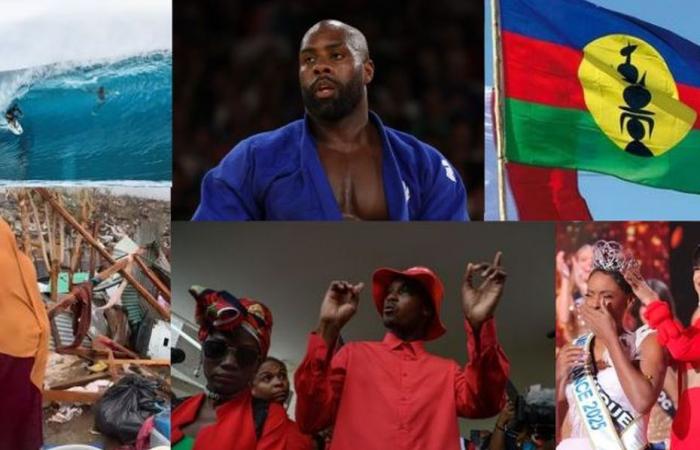
From the riots in New Caledonia to the election, for the first time, of a Miss France from Martinique, La 1ère invites you to look back at the highlights of overseas news in 2024.
What should we remember from overseas news in 2024? Social conflicts, natural disasters, sporting victories… A look back at the most significant events of the past year.
On the morning of December 14, Cyclone Chido devastated Mayotte. This is the first time in 90 years that such a cyclone has hit the island. Gusts of more than 220 km/h are recorded. The trajectory of the wind monster is exceptional. Usually, cyclones avoid Mayotte and fly over its neighbor, Madagascar. But this time, the eye passes just above the French island. Chido rips off roofs, uproots trees, overturns boats. Permanent buildings are damaged, entire slums are wiped off the map. Of the 320,000 inhabitants of Mayotte officially, 100,000 live in informal neighborhoods.
•
©Mayotte La 1ère
As of December 29, 2024, the provisional report shows 39 deaths and more than 4,000 injured. Because the majority of the inhabitants of the slums are people in an irregular situation, unknown to state services, and because Muslim tradition requires the dead to be buried very quickly after their death, the exact human toll of the disaster will not be without doubt never known, as the Minister for Overseas Territories recognized a few days after the tragedy.
•
©Mayotte the 1st
After the cyclone hit, the airport was out of service, the network was cut in a large part of the island, and many residents had no access to water or electricity. Faced with the tragedy, calls for solidarity are multiplying. Aid is organized from Reunion Island, the Minister of the Interior, then the President of the Republic, go there. But, more than a week after the cyclone struck, some residents still have no water and the food packages distributed to the victims are disappointing. Criticized for having preferred to attend the Pau municipal council rather than participating in person in a crisis meeting on Mayotte shortly after his appointment, the Prime Minister, François Bayrou, finally went there on December 30.
While the National Assembly is discussing a thaw of the electoral body, in New Caledonia, separatists are erecting roadblocks to protest against the measure. On the night of May 13, the greater Nouméa area caught fire. Shops are looted, businesses burned, roads are blocked.
•
©Coralie Cochin / NC la 1ère
Faced with activists, militias are formed. Armed, these defense groups, “vigilant neighbors”, filter entrances to protect their neighborhoods. Violent clashes between rioters and militiamen, but also between rioters and police, broke out. In total, 14 people lost their lives, twelve civilians and two gendarmes on mission. On May 16, the President of the Republic declared a state of emergency, the army was deployed in the territory and the social network TikTok was banned.
The violence, which lasted several weeks, brought the New Caledonian economy to its knees. The damage is estimated at 2.2 billion euros. 700 businesses were affected, more than a third of productive capital disappeared, and one in seven employees lost their job between March and September.
•
©NC the 1st
In June, five CCAT activists, the Field Action Coordination Cell, a Kanak independence organization, are incarcerated in France. Justice suspects them of having orchestrated the riots. Christian Tein, the spokesperson for the CCAT, imprisoned in Mulhouse, 17,000 km from home, considers himself “a political prisoner”.
If the reform of the electoral body has been suspended, the project is not buried yet. Paris still hopes that an agreement can be found between independentists and non-independenceists before the next provincial elections, which must be held no later than November 2025. While political dialogue is struggling to resume between the different parties, the government of Nouvelle -Caledonia falls on December 24. The new team must be appointed on January 7.
Of the 64 medals collected by the French delegation at the Paris 2024 Olympic Games, almost a third were won by overseas athletes. If we compare the number of titles in relation to the population of the departments, Guadeloupe is the territory which has brought the most medals to France.
It was also two Guadeloupean athletes, judoka Teddy Riner and triple Olympic athletics champion Marie-José Pérec who lit the Olympic cauldron on July 26 in the Tuileries gardens in Paris. As a team or individually, from the performance of Teddy Riner, who became the most successful judoka in history to that of Althéa Laurin, a young taekwondo player from Martinique, who won the first French gold medal in her discipline, the Ultramarines made Paris vibrate.
•
©BRIAN NOCANDY / AFP
But the games are not only held in France. On August 5, Kauli Vaast became Olympic surfing champion at home in Polynesia, on the legendary Teahupo’o wave. Reunion Islander Johanne Defay took bronze. Performances which somewhat made us forget the controversies surrounding the holding of surfing events in Tahiti. Because it was placed directly on the reef, the Judges Tower was accused of endangering the exceptional biodiversity of the site.
•
©ED SLOANE / POOL
The Ultramarines also distinguished themselves during the Paralympic Games. We remember the performance of Reunionese Laurent Chardard, bronze medalist in para swimming, or the very good victory of the Cécifoot Blues, who won in the final against Argentina, in particular thanks to Gaël Rivière, also from Reunion.
At the call of the Rally for the Protection of Afro-Caribbean Peoples and Resources (RPPRAC), a demonstration against the high cost of living is organized on 1is September in Martinique. The leader of the movement, Rodrigue Petitot, nicknamed “the R”, calls for an alignment of prices between those practiced on the island and in France. In the Antilles, food products cost up to 40% more than in mainland France.
•
©Carl BLS
From mid-September, nights of violence follow one another. At the beginning of October, gendarmes were slightly injured by gunfire. On the 10th, demonstrators invaded the airport runway, forcing planes to land in Guadeloupe.
On October 16, an agreement between distributors, wholesalers, elected officials and state services are found. He predicts a drop in prices “around 20%” for 6,000 everyday consumer products. The agreement does not satisfy the RPPRAC, which does not sign it.
On November 11, Rodrigue Petitot was arrested after entering the prefect’s residence. The detention of the leader of the movement rekindles tensions. During the night of November 12 to 13, vehicles, buildings, but also palm trees were set on fire in Fort-de-France. THE December 2, Rodrigue Petitot is sentenced to 10 months of imprisonment. He is currently in detention. A new trial is scheduled for January.
•
©Social Networks / DR
The price cut was to come into force on January 1, 2025, but the fall of the Barnier government prevented the implementation of the agreement negotiated in October.
Angélique Angarni-Filopon, unsuccessful candidate during Miss Martinique in 2011, took advantage of the lifting of the age limit in 2023 to try her luck again. Dean of the competition, the young woman won the 95th edition of Miss France at Futuroscope in Poitiers. At 34, Angélique Angarni-Filopon is the first Martinican to wear the crown. His age, but also his skin color, led to a wave of cyberharassment.
•
©SIPA
Another specificity of this edition of Miss France: New Caledonia did not send a beauty queen to Poitiers. Due to the riots and their consequences, the local committee was unable to organize the election this year. Emma Grousset, the sister of swimmer Maxime Grousset, bronze medalist at the Paris Olympics, therefore retained her title of Miss New Caledonia for one more year.




